Fennel: 6 Exclusive Health Benefits
Introduction
Fennel (Foeniculum vulgare) a.k.a saunf in Urdu is a remarkable herb that has captivated the culinary world for centuries with its delightful fragrance and flavor. Originating from the sun-kissed Mediterranean region, this versatile plant has journeyed across the globe, earning a cherished spot in various cuisines and holistic healing practices. Known for its unique licorice-like taste, it is not just a treat for the palate; it also boasts a variety of health benefits that make it a true botanical wonder.
I have already discussed different herbs in my blogs. In this blog, we will delve into the fascinating qualities of this remarkable herb, examining not only its six distinct health benefits but also the techniques for growing it and three unique culinary uses. Whether incorporated into savory dishes or utilized for its therapeutic effects, fennel truly enhances both meals and wellness practices.
Botanical Profile
Fennel is a fascinating herbaceous plant that belongs to the Apiaceae family, which also includes well-known vegetables such as carrots, celery, and parsley. With its delicate, feathery leaves and beautiful yellow flowers that bloom in umbrella-shaped clusters, it is a treat for both the eyes and the palate. The bulbous base of this perennial plant is edible, and its aromatic seeds and flavorful leaves add a delightful twist to various dishes.
Fennel thrives in dry, sunny environments and can grow to an impressive height of about five feet. Its strong root system makes it remarkably resilient against drought, making this hardy and adaptable plant an excellent choice for a wide range of growing conditions. Whether you are a culinary enthusiast or a gardening aficionado, fennel is sure to capture your interest!
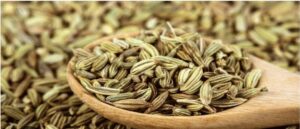
Historical and Cultural Significance
Fennel has been used throughout history. The ancient Egyptians, Greeks, and Romans revered it for its medicinal and gastronomic qualities. In Greek mythology, Prometheus is thought to have stolen fire from the gods with a fennel stalk. The Romans used it to flavor their food and saw it as a symbol of power and life. During the Middle Ages, fennel was thought to ward off evil spirits and was often hung over doors.
Fennel seeds are an important part of Ayurvedic treatment and are commonly ingested after meals to help digestion. Fennel is also known for its warming effects in traditional Chinese medicine, where it is used to cure indigestion and colds.
Nutritional Composition
Fennel is an incredibly nutritious vegetable, offering a wide array of essential nutrients that contribute to a healthy diet. In every 100-gram serving of raw fennel bulb, you’ll find:
- Calories: A modest 31, making it a low-calorie option for those looking to manage their weight.
- Carbohydrates: 7.3 grams, which provides a healthy source of energy for daily activities.
- Fiber: 3.1 grams, which supports digestive health and helps maintain a feeling of fullness.
- Protein: 1.2 grams, contributing to muscle repair and growth, though it is not a high-protein food.
- Fat: Extremely low at just 0.2 grams, making fennel a heart-healthy choice.
In terms of vitamins and minerals, fennel is particularly notable for its vitamin C content, providing 20% of the daily value (DV) in a single serving. Vitamin C is essential for immune function, skin health, and the absorption of iron from plant sources.
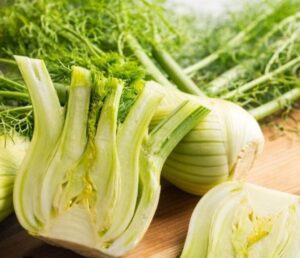
Additionally, it is a good source of potassium, delivering 10% of the DV. Potassium is vital for maintaining healthy blood pressure and proper muscle and nerve function.
Moreover, fennel contains moderate amounts of other important minerals such as calcium, magnesium, and iron, each playing crucial roles in bone health, metabolism, and oxygen transport in the body.
It’s worth mentioning that its seeds are even more nutrient-rich than the bulb, characterized by higher concentrations of essential oils, flavonoids, and antioxidants. These compounds enhance the flavor of dishes and offer potential health benefits, such as reducing inflammation and combating oxidative stress.
In summary, incorporating fennel into your diet can provide nutritional advantages while adding a unique flavor to various culinary creations.
Health Benefits
Fennel is a powerhouse of health benefits, celebrated for centuries in traditional remedies and now backed by cutting-edge scientific research. Discover how this remarkable herb can enhance your well-being in delightful ways!
1. Digestive Health
This wonderful herb is widely recognized for its positive effects on digestive health. This aromatic herb contains essential oils, particularly anethole, fenchone, and estragole, which are essential for soothing and relaxing the digestive tract. These compounds are known to alleviate common gastrointestinal issues such as bloating, cramping, and gas.
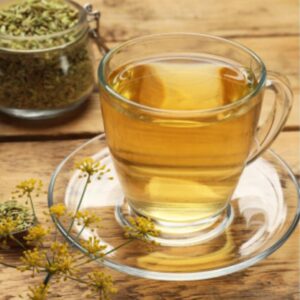
The anti-spasmodic properties help relieve tension in the muscles of the digestive system, promoting smoother digestion and reducing the frequency of painful cramps. Additionally, fennel tea has become popular as a natural remedy for various digestive problems, including indigestion and Irritable Bowel Syndrome (IBS). Many people enjoy fennel tea not only for its pleasant flavor but also for its calming effects, which can help restore balance to the digestive system and enhance overall well-being.
Fennel, whether consumed as tea or added to meals, is a powerful ally in maintaining digestive health and comfort.
2. Anti-inflammatory and Antioxidant Properties
It is rich in polyphenols, a group of bioactive compounds known for their strong antioxidant properties. These antioxidants play a crucial role in neutralizing harmful free radicals in the body, helping to combat oxidative stress. It reduces oxidative stress and contributes to lower inflammation levels. This anti-inflammatory effect is particularly important since chronic inflammation is linked to various health issues. Regular consumption of fennel may, therefore, help reduce the risk of developing chronic diseases such as heart disease and diabetes, making it a valuable addition to a health-focused diet. In addition to its antioxidant benefits, fennel provides other essential nutrients and compounds that promote overall well-being.
3. Hormonal Balance
Fennel is a herb that contains phytoestrogens—naturally occurring plant compounds that can mimic the effects of estrogen in the human body. This characteristic makes it especially beneficial for women going through menopause, a stage characterized by significant hormonal changes. During this transition, many women experience a variety of symptoms, including hot flashes, mood swings, and heightened emotional sensitivity. The phytoestrogens in it may offer a natural way to alleviate some of these discomforts by helping to balance hormonal fluctuations, potentially providing relief and improving overall well-being during this challenging phase of life. Additionally, fennel is rich in antioxidants and other nutrients, further enhancing its health-promoting properties.
4. Heart Health
Fennel is an excellent source of dietary fiber, which plays a crucial role in promoting cardiovascular health. Its high fiber content helps lower cholesterol levels by binding to bile acids in the digestive system, which can lead to a reduction in overall cholesterol levels in the blood. This is particularly beneficial for heart health, as high cholesterol is a significant risk factor for cardiovascular diseases.
In addition to its fiber benefits, fennel contains notable amounts of potassium and nitrates, which contribute to the regulation of blood pressure. Potassium is essential for maintaining proper fluid balance in the body and helps relax blood vessel walls, potentially leading to lower blood pressure. Meanwhile, the nitrates found in this can enhance blood flow and improve overall circulation, further decreasing the risk of developing hypertension. By incorporating fennel into your diet, you can take proactive steps to support and protect your cardiovascular system.
5. Weight Management
Fennel is a remarkable herbal plant that offers a treasure trove of health benefits, especially when it comes to weight management. Imagine enjoying a delicious cup of fennel tea, which is not only low in calories but also packed with dietary fiber. This powerful combination helps you feel fuller for longer, making it easier to keep your cravings in check.
Picture this: sipping on a warm, aromatic cup of fennel tea before your meals. Not only does it tantalize your taste buds, but it also works wonders for your digestive health. This soothing ritual can help you resist the urge to overindulge, allowing you to enjoy your food while still sticking to your weight loss goals.
So, why not incorporate this tea into your daily routine? It’s a simple yet effective way to support a healthier lifestyle and savor the journey toward your wellness aspirations!
6. Immune System Booster
Fennel is rich in vitamin C, an essential nutrient that plays a crucial role in boosting the immune system. This vitamin enhances immune function by promoting the production of white blood cells, which are vital for defending the body against infections and diseases. Additionally, vitamin C serves as a powerful antioxidant, helping to neutralize harmful free radicals that can cause cellular damage and lead to various health issues. By adding fennel to your diet, you can support your body’s natural defenses and improve your overall health.
Culinary Uses
Fennel’s remarkable versatility in the kitchen has earned it a prominent place in a variety of global cuisines. This aromatic herb and vegetable, with its distinct anise-like flavor, adds depth to dishes ranging from Mediterranean salads to South Asian curries. Chefs and home cooks alike appreciate it for its ability to enhance both savory and sweet recipes, making it an essential ingredient in everything from soups and stews to baked goods. Its various parts—bulb, fronds, and seeds—can be utilized in diverse ways, showcasing its culinary potential across different cultures and cooking styles.
1. Fennel Bulb
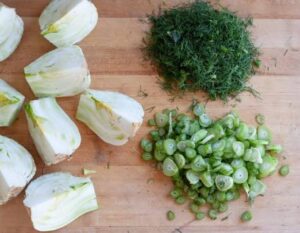
The crisp and slightly sweet bulb is incredibly versatile and can be enjoyed in many ways. When eaten fresh, it adds a delightful crunch and a hint of sweetness to salads, making it an excellent addition to both green and grain-based dishes. Roasting the bulb enhances its natural sugars, resulting in a rich, caramelized flavor that pairs wonderfully with various proteins. For a more tender texture, braising the bulb allows its inherent sweetness to shine through, creating a comforting side dish. Additionally, this bulb complements a wide array of ingredients, harmonizing beautifully with citrus fruits, seafood, and different types of meat, adding depth and balance to any meal.
2. Fennel Seeds
Seeds are a versatile spice used in various culinary traditions, particularly in South Asian, Middle Eastern, and Italian cuisines. They add a distinct, aromatic flavor that enhances the depth and complexity of numerous dishes. In South Asian cooking, fennel seeds are often included in curries, where they contribute a sweet, anise-like note that balances the spices. In Italian cuisine, they can be used to flavor breads and sausages, enriching the overall taste profile.
Roasting fennel seeds is a technique that can significantly enhance their aromatic qualities and intensify their flavor. This process brings out a warm, nutty essence that complements both savory and sweet dishes. When added to recipes after roasting, they provide not only a burst of flavor but also a delightful crunch, making them an essential ingredient in many recipes across different cultures.
3. Fennel Leaves
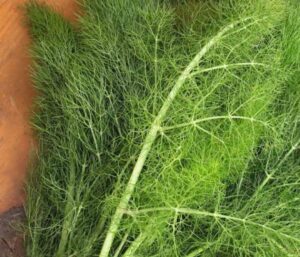
The delicate, feathery fronds can serve both as an elegant garnish and as a key ingredient in various culinary creations. When mixed into pesto, they add a unique dimension, enhancing the dish with an intriguing flavor profile. Incorporating these fronds into hearty soups infuses the broth with a refreshing, herbaceous quality that elevates the overall taste. In seafood dishes, their subtle anise-like flavor complements the natural sweetness of the fish or shellfish, creating a harmonious balance that delights the palate. Whether used as a finishing touch or as a main component, these fronds bring a fresh and vibrant essence to a wide variety of recipes.
Growing Techniques
This plant is a rewarding herb to grow in home gardens because it is relatively easy to cultivate and versatile in cooking. This aromatic plant thrives best in well-drained soil that allows for proper aeration and root development. It prefers full sun, ideally receiving at least six hours of direct sunlight each day, which enhances its flavor and growth rate.
You can start from seeds, which can either be sown directly in the garden or started indoors and later transplanted outside. It thrives in mild temperatures, generally between 60°F and 70°F (15°C to 21°C), making it an excellent candidate for spring or fall planting, depending on your climate.
In terms of watering, it requires regular irrigation to keep the soil consistently moist. However, it’s important to avoid waterlogging, as overly saturated soil can lead to root rot and other issues. A good practice is to allow the top inch of soil to dry out between watering sessions.
Bulbs are typically ready to harvest when they reach about 3 to 4 inches in diameter, usually around 90 to 100 days after planting. At this size, the bulbs are tender and flavorful. Additionally, plants will develop feathery fronds and flowers. Once the seeds turn a rich brown color, they are ready to be collected for culinary use or for replanting in the next growing season. With proper care, fennel can be a delightful addition to your garden and kitchen.
Potential Side Effects and Precautions
Fennel is an herb from the Apiaceae family, widely recognized as a safe culinary ingredient and natural remedy. However, caution is necessary regarding its essential oil, as excessive consumption can lead to adverse effects. Due to the concentrated nature of essential oils, even small amounts can significantly impact the body, potentially causing issues like nausea, dizziness, or allergic reactions in sensitive individuals.
Pregnant women should be particularly careful when considering the use of this herb, as it has estrogenic properties that may affect hormonal balance. This poses potential risks during pregnancy, so expectant mothers should consult with healthcare providers before adding fennel or its extracts to their diet.
Additionally, individuals allergic to plants in the Apiaceae family—such as carrots, celery, and parsley—should approach it with caution. Allergic reactions can range from mild symptoms, like skin rashes, to more severe responses, including difficulty breathing. Therefore, those with known allergies or sensitivities should seek medical advice before consuming fennel or its derivatives.
Conclusion
This is a magnificent herb with an interesting history, a strong nutritional profile, and numerous health advantages. It is still a valuable addition to diets worldwide, whether it’s eaten, brewed into tea, or used medicinally. Its exquisite flavor and medicinal capabilities cement its status as a timeless botanical gem.
Disclaimer
The content provided on this website is purely for educational purposes. We are neither nutritionists nor do we intend to mislead our readers by providing any medical or scientific information.







